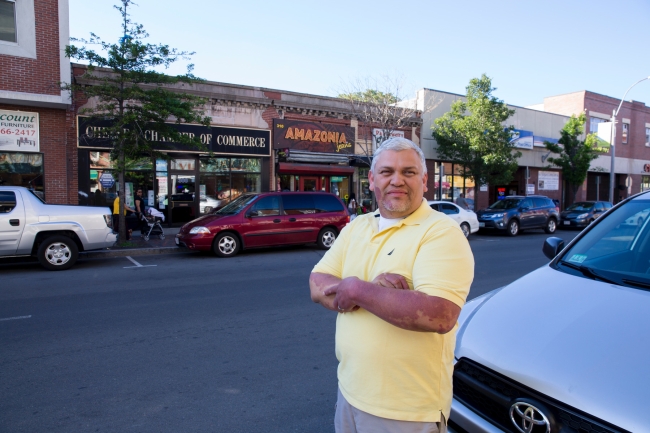You have /5 articles left.
Sign up for a free account or log in.

Francisco Rodriguez-Guardado
Photo by Rose Lincoln
A custodian at the Massachusetts Institute of Technology has been detained by immigration authorities and is facing possible deportation in a case that has attracted widespread attention at MIT and beyond.
MIT students and administrators have rallied on behalf of Francisco Rodriguez-Guardado, who fled his native El Salvador due to what his lawyer described as specific threats of gang violence and entered the U.S. in 2006. Immigration authorities rejected his claim for asylum in 2011 and issued a final order of removal, but U.S. Immigration and Customs Enforcement used its discretion to issue successive one-year stays of deportation to Rodriguez, who has two young daughters, both American citizens, and a baby due next week.
Rodriguez’s advocates say immigration authorities should continue to use their discretion to allow him to stay in the country. But earlier this year ICE moved to act on his six-year-old removal order and, on July 13, took him into custody, where he remains.
Rodriguez’s lawyers have filed a motion to reopen his asylum case and are also challenging his detention in federal court. In addition to the support he’s received from MIT, Massachusetts’ two U.S. senators, Ed Markey and Elizabeth Warren, and U.S. Congressman Michael Capuano, whose district includes much of Boston and Cambridge and the city of Chelsea, where Rodriguez lives, wrote a joint letter of support for Rodriguez.
“He’s more than proven himself as a worthy citizen during the time that he’s been here. He’s always worked very hard, pays his taxes, is married, has kids, has another kid coming, a baby due on August 3rd,” said Matt Cameron, one of Rodriguez's lawyers. “This is obviously a very, very difficult time for his family.”
Cameron said that Rodriguez has no criminal record and that the only thing that’s changed in his case is “that we have an administration that wants to act on all final deportation orders, with no discretion and no distinction.”
“If they’re not going to give discretion to someone with a spouse with a high-risk pregnancy due in a few weeks from the time from when they took him, I don’t know who they’re going to give it to, especially given the enormous amount of support he's gotten from MIT” and others, Cameron said.
An online petition in support of Rodriguez was signed by more than 1,000 individuals identifying as MIT students, alumni or staff, and the MIT Undergraduate Association wrote a letter on his behalf. The university administration has also gotten involved. In an interview with MIT's news office, the university's general counsel, Mark DiVincenzo, said MIT had gotten involved in various ways, including by writing letters in support of Rodriguez and by “securing a prominent Boston law firm to join his legal team, pro bono.”
“Certainly, reasonable people can disagree on our nation’s immigration policy,” Israel Ruiz, MIT’s executive vice president and treasurer, said in the interview with the university's news service. “But standing with Francisco isn’t about politics or Washington. It’s about seeking fair treatment for an upstanding individual who is the breadwinner for a young family, works at MIT, and has his own business, and who has consistently proven his value to MIT and to his home community in Chelsea.”
Ruiz, who oversees MIT's facilities and human resources departments, described Rodriguez as “an excellent employee, even earning a promotion in the past five years.” He had been granted permits to work in the U.S.
Rodriguez’s union, 32BJ of the Service Employees International Union, has also been involved in advocating on his behalf. “There’s no law that is obligating for him to be deported; it’s really about if ICE is going to use its discretion or not,” said Roxana Rivera, who described Rodriguez as active in his church, community and children’s school and as the main provider for his family.
“They’ve always had discretion. They’ve had broad discretion about determining who is a criminal, who’s not, who poses a threat and who doesn’t. There’s still an avenue here for them to say, 'we’re not going to focus on Francisco,'” Rivera said.
An ICE spokesman declined to comment on pending litigation. In a statement, the agency said, “On June 13, Francisco Rodriguez-Guardado, an unlawfully present citizen of El Salvador, reported to the ICE office in Boston, per prior agreement. An immigration judge issued Mr. Rodriguez a final order of removal in 2009. Since then, he has been granted four stays of removal so he could pursue available legal remedies.”
“After reviewing his case and in a further exercise of discretion, ICE chose not to place him in custody, allowing him to make timely departure arrangements.”
“After he failed to do so, he was placed into ICE custody, where he’ll remain pending the outcome of his immigration case.”
Rodriguez’s lawyer, Cameron, contested the accuracy of the ICE statement, saying that Rodriguez had, as he was instructed in June, brought a plane ticket for a direct departure to El Salvador to a scheduled July 13 check-in with ICE: Cameron said the government did not specify a time frame for departure, and that the purchased plane ticket was for mid-September, about six weeks after his baby is due. Cameron pointed out that the official government notice stating that Rodriguez would be taken into custody does not say anything about him not complying with ICE requirements, and further pointed out that testimony filed in the federal court case from an ICE acting assistant field office director, Yolanda Marfissi, revealed the government’s original plans to transfer Rodriguez out of Massachusetts on July 17 and remove him from the country on July 20 – one week after the July 13 check-in with ICE when he was detained.
“They were prepared to detain him and that was always going to be the plan,” Cameron said.
An ICE spokesman said, "We stand by our statement."




